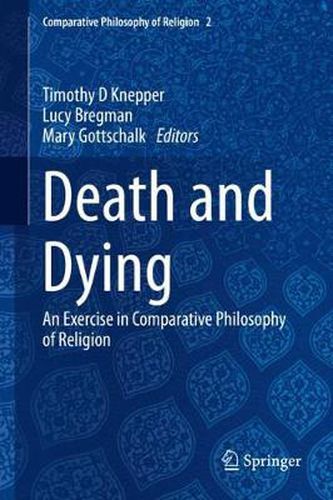Readings Newsletter
Become a Readings Member to make your shopping experience even easier.
Sign in or sign up for free!
You’re not far away from qualifying for FREE standard shipping within Australia
You’ve qualified for FREE standard shipping within Australia
The cart is loading…






This title is printed to order. This book may have been self-published. If so, we cannot guarantee the quality of the content. In the main most books will have gone through the editing process however some may not. We therefore suggest that you be aware of this before ordering this book. If in doubt check either the author or publisher’s details as we are unable to accept any returns unless they are faulty. Please contact us if you have any questions.
The medicalization of death is a challenge for all the world’s religious and cultural traditions. Death’s meaning has been reduced to a diagnosis, a problem, rather than a mystery for humans to ponder. How have religious traditions responded? What resources do they bring to a discussion of death’s contemporary dilemmas? This book offers a range of creative and contextual responses from a variety of religious and cultural traditions. It features 14 essays from scholars of different religious and philosophical traditions, who spoke as part of a recent lecture and dialogue series of Drake University’s The Comparison Project. The scholars represent ethnologists, medical ethicists, historians, philosophers, and theologians–all facing up to questions of truth and value in the light of the urgent need to move past a strictly medicalized vision.
This volume serves as the second publication of The Comparison Project, an innovative new approach to the philosophy of religion housed at Drake University. The Comparison Project organizes a biennial series of scholar lectures, practitioner dialogues, and comparative panels about core, cross-cultural topics in the philosophy of religion. The Comparison Project stands apart from traditional, theistic approaches to the philosophy of religion in its commitment to religious inclusivity. It is the future of the philosophy of religion in a diverse, global world.
$9.00 standard shipping within Australia
FREE standard shipping within Australia for orders over $100.00
Express & International shipping calculated at checkout
This title is printed to order. This book may have been self-published. If so, we cannot guarantee the quality of the content. In the main most books will have gone through the editing process however some may not. We therefore suggest that you be aware of this before ordering this book. If in doubt check either the author or publisher’s details as we are unable to accept any returns unless they are faulty. Please contact us if you have any questions.
The medicalization of death is a challenge for all the world’s religious and cultural traditions. Death’s meaning has been reduced to a diagnosis, a problem, rather than a mystery for humans to ponder. How have religious traditions responded? What resources do they bring to a discussion of death’s contemporary dilemmas? This book offers a range of creative and contextual responses from a variety of religious and cultural traditions. It features 14 essays from scholars of different religious and philosophical traditions, who spoke as part of a recent lecture and dialogue series of Drake University’s The Comparison Project. The scholars represent ethnologists, medical ethicists, historians, philosophers, and theologians–all facing up to questions of truth and value in the light of the urgent need to move past a strictly medicalized vision.
This volume serves as the second publication of The Comparison Project, an innovative new approach to the philosophy of religion housed at Drake University. The Comparison Project organizes a biennial series of scholar lectures, practitioner dialogues, and comparative panels about core, cross-cultural topics in the philosophy of religion. The Comparison Project stands apart from traditional, theistic approaches to the philosophy of religion in its commitment to religious inclusivity. It is the future of the philosophy of religion in a diverse, global world.